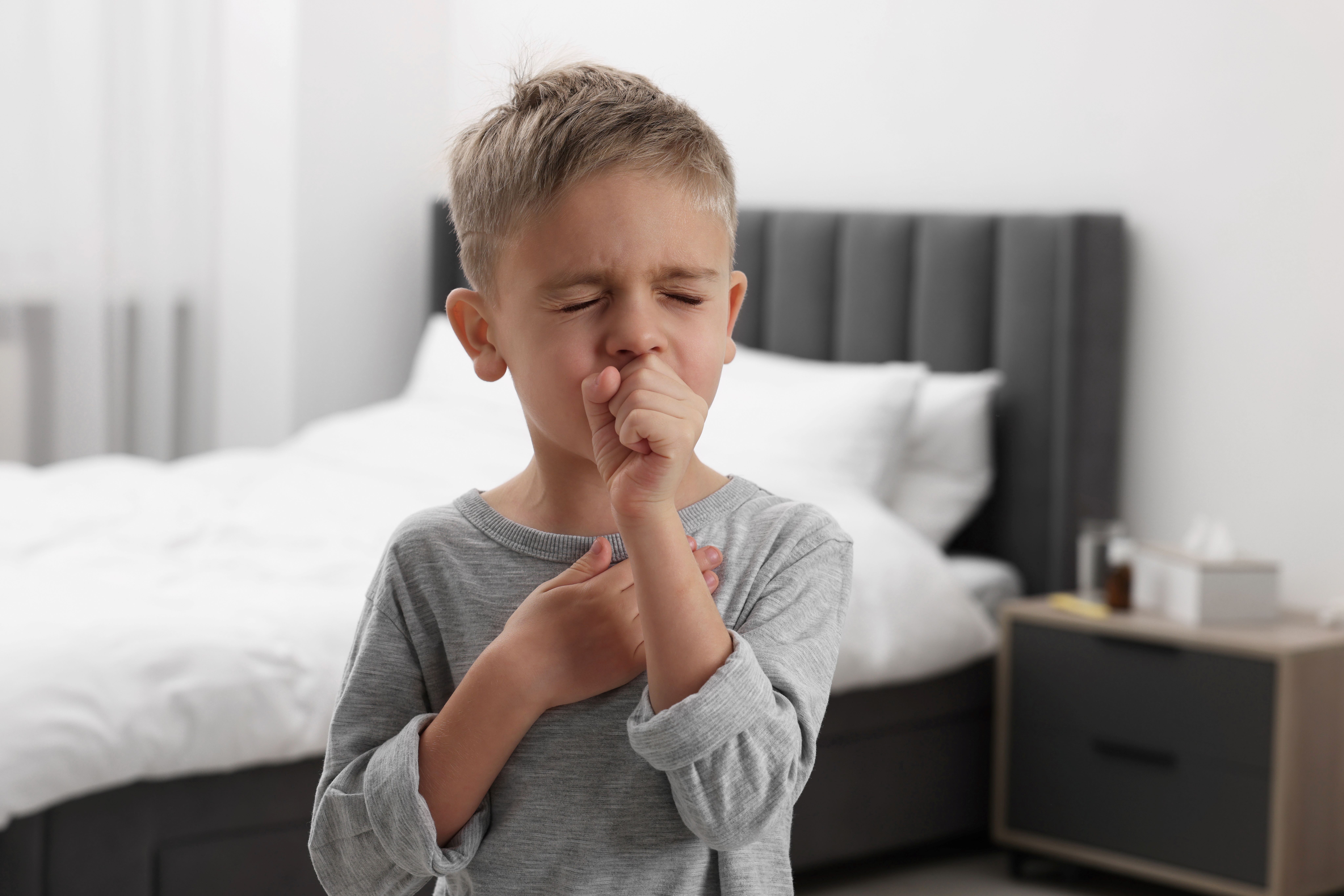Coughing is a natural reflex that helps clear your airways of irritants, but when it becomes persistent, it may be more than just a nuisance. If you or your family members find yourselves coughing more frequently at home, poor indoor air quality could be the culprit. While outdoor pollution is often highlighted in discussions about respiratory health, the air inside your home can be just as harmful—or even worse. This article delves into how indoor air quality impacts your respiratory health, why it can cause persistent coughing, and what you can do to improve the air in your home.
Understanding Indoor Air Quality (IAQ) and Its Impact on Health
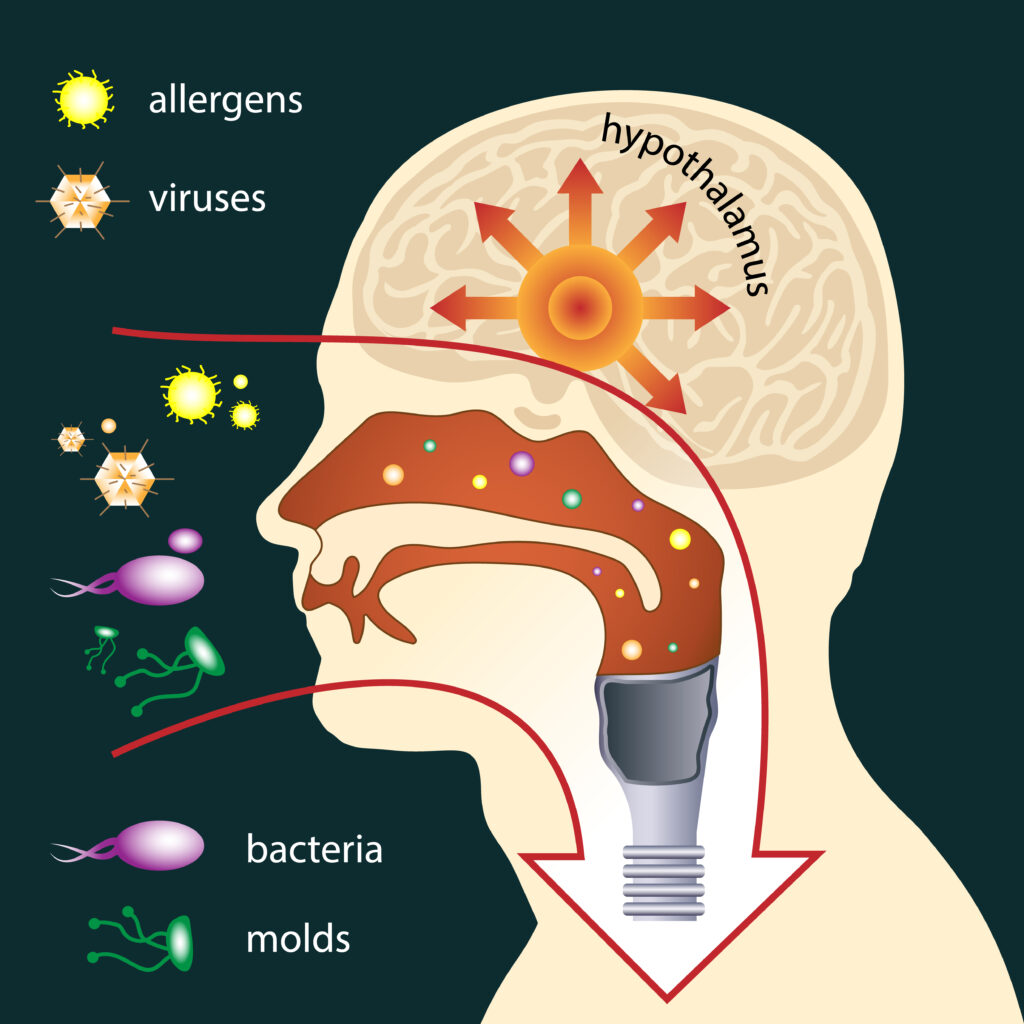
Indoor air quality (IAQ) refers to the condition of the air inside buildings and structures, particularly concerning the health and comfort of the occupants. The quality of indoor air can be affected by various factors, including pollutants, humidity levels, ventilation, and the presence of allergens.
Common Indoor Air Pollutants Include:
- Particulate Matter (PM): These tiny particles, which can include dust, dirt, soot, and smoke, are often small enough to be inhaled. Fine particulate matter (PM2.5) is particularly dangerous because it can penetrate deep into the lungs.
- Volatile Organic Compounds (VOCs): These are chemicals that evaporate into the air from household products like paints, varnishes, cleaners, and even furniture. Common VOCs include formaldehyde, benzene, and acetone.
- Mold Spores: Mold can grow in damp areas of your home, releasing spores into the air. Inhalation of these spores can cause respiratory issues, especially in people with allergies or asthma.
- Pet Dander: Tiny flecks of skin shed by cats, dogs, and other pets can become airborne and contribute to poor indoor air quality.
- Dust Mites: These microscopic creatures thrive in warm, humid environments and are common allergens. Their waste products can become airborne and exacerbate respiratory problems.
- Tobacco Smoke: Secondhand smoke from cigarettes or cigars contains thousands of harmful chemicals, many of which are known to cause cancer.
How Poor Indoor Air Quality Leads to Persistent Coughing
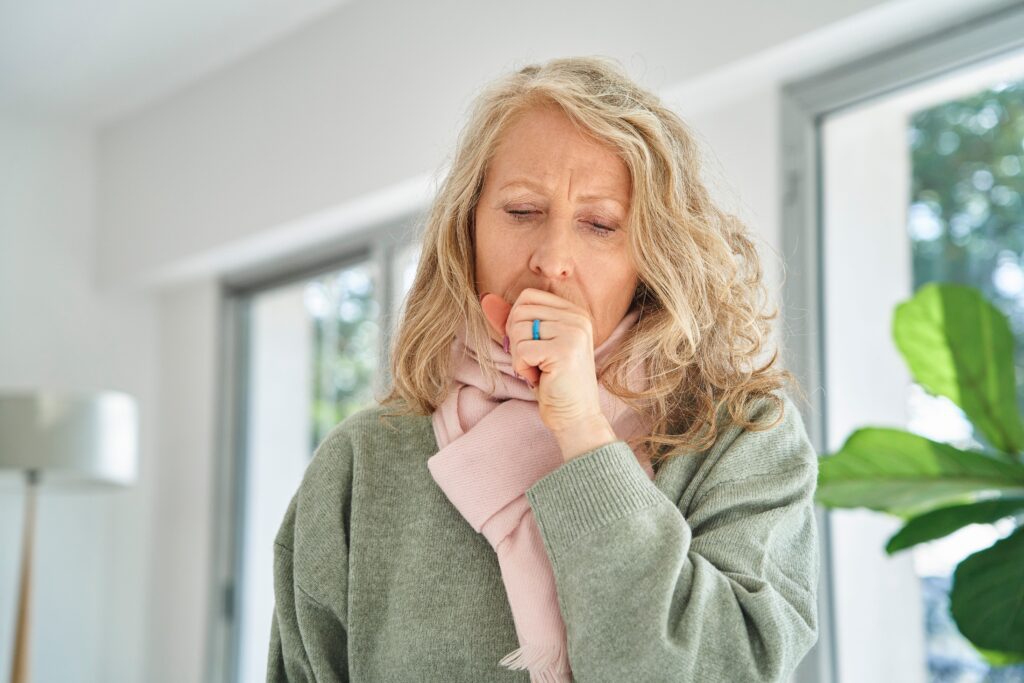
Persistent coughing is one of the most common symptoms of exposure to poor indoor air quality. Here’s how the various pollutants mentioned above can trigger a chronic cough:
1. Irritation of the Respiratory Tract:
When you breathe in polluted air, the fine particles, chemicals, and allergens can irritate the mucous membranes lining your respiratory tract. This irritation leads to inflammation, which in turn stimulates the cough reflex. Over time, repeated exposure can cause chronic inflammation, making the cough persistent.
2. Allergic Reactions:
Indoor allergens like mold spores, pet dander, and dust mites can trigger allergic reactions in sensitive individuals. These reactions often involve the release of histamines, which cause symptoms like coughing, sneezing, and a runny nose. In some cases, the cough can be severe and continuous.
3. Asthma Exacerbation:
For people with asthma, poor indoor air quality can be particularly problematic. Pollutants like VOCs, particulate matter, and smoke can trigger asthma attacks, which often include coughing, wheezing, and shortness of breath. Even in those without asthma, prolonged exposure to these irritants can lead to the development of asthma-like symptoms.
4. Respiratory Infections:
Poor air quality can weaken the immune system, making it easier for infections to take hold. Inhaling pollutants can cause inflammation and reduce the effectiveness of the respiratory system’s defenses, leading to infections like bronchitis or pneumonia. These infections often result in a persistent cough that can last for weeks or even months.
5. Chronic Obstructive Pulmonary Disease (COPD):
Long-term exposure to indoor air pollutants, especially tobacco smoke, can contribute to the development of chronic obstructive pulmonary disease (COPD). This group of lung diseases includes chronic bronchitis and emphysema, both of which are characterized by a persistent cough and difficulty breathing.
Identifying the Sources of Poor Indoor Air Quality
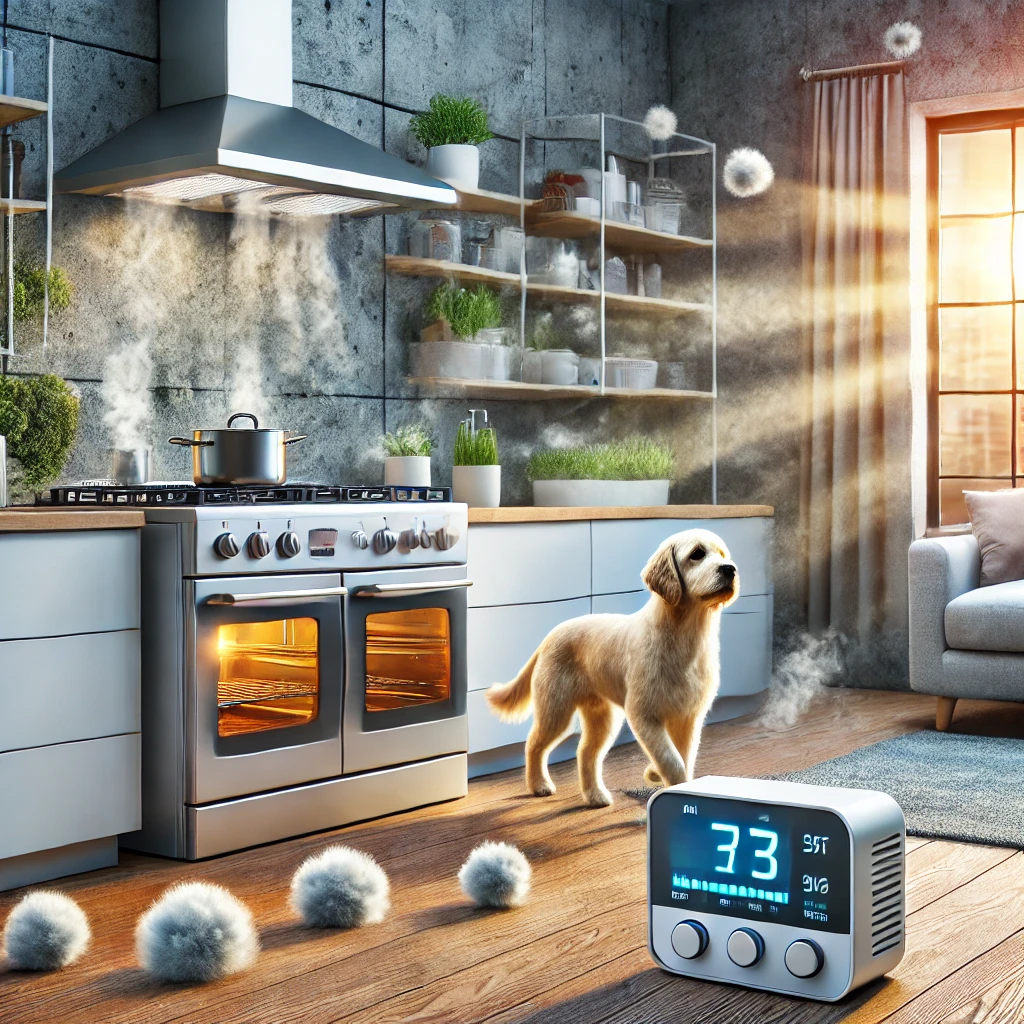
To address the problem of persistent coughing due to poor indoor air quality, it’s crucial to identify the sources of pollution in your home. Here are some common sources and how they contribute to the problem:
1. Household Cleaning Products:
Many cleaning products contain chemicals that release VOCs into the air. These VOCs can linger long after cleaning is done, contributing to indoor air pollution. Common culprits include bleach, ammonia, and products with strong fragrances.
2. Cooking Activities:
Cooking, especially on gas stoves, can release a significant amount of particulate matter and nitrogen dioxide (NO2) into the air. Without proper ventilation, these pollutants can build up and contribute to respiratory irritation.
3. Building Materials:
Some building materials, like pressed wood products, carpeting, and insulation, can off-gas VOCs for years after installation. Formaldehyde, a common VOC, is often found in these materials and is a known respiratory irritant.
4. Inadequate Ventilation:
Poor ventilation can trap pollutants inside your home, allowing them to accumulate to unhealthy levels. This is especially common in modern, energy-efficient homes that are tightly sealed to conserve energy but lack proper air exchange systems.
5. Pet Ownership:
Pets are a common source of indoor allergens, especially in households with multiple animals. Pet dander and hair can easily become airborne, and in homes with poor air circulation, these allergens can contribute to chronic respiratory symptoms.
6. Mold Growth:

Damp areas in your home, such as bathrooms, basements, and kitchens, are prime locations for mold growth. Mold releases spores into the air, which can be inhaled and cause coughing, sneezing, and other respiratory symptoms.
7. Tobacco Smoke:
Even if smoking is confined to certain areas of the home, tobacco smoke can spread throughout the house, contaminating the air and increasing the risk of respiratory problems for everyone in the household.
Steps to Improve Indoor Air Quality and Reduce Coughing
Improving indoor air quality is key to reducing or eliminating a persistent cough. Here’s a comprehensive guide to help you tackle the issue:
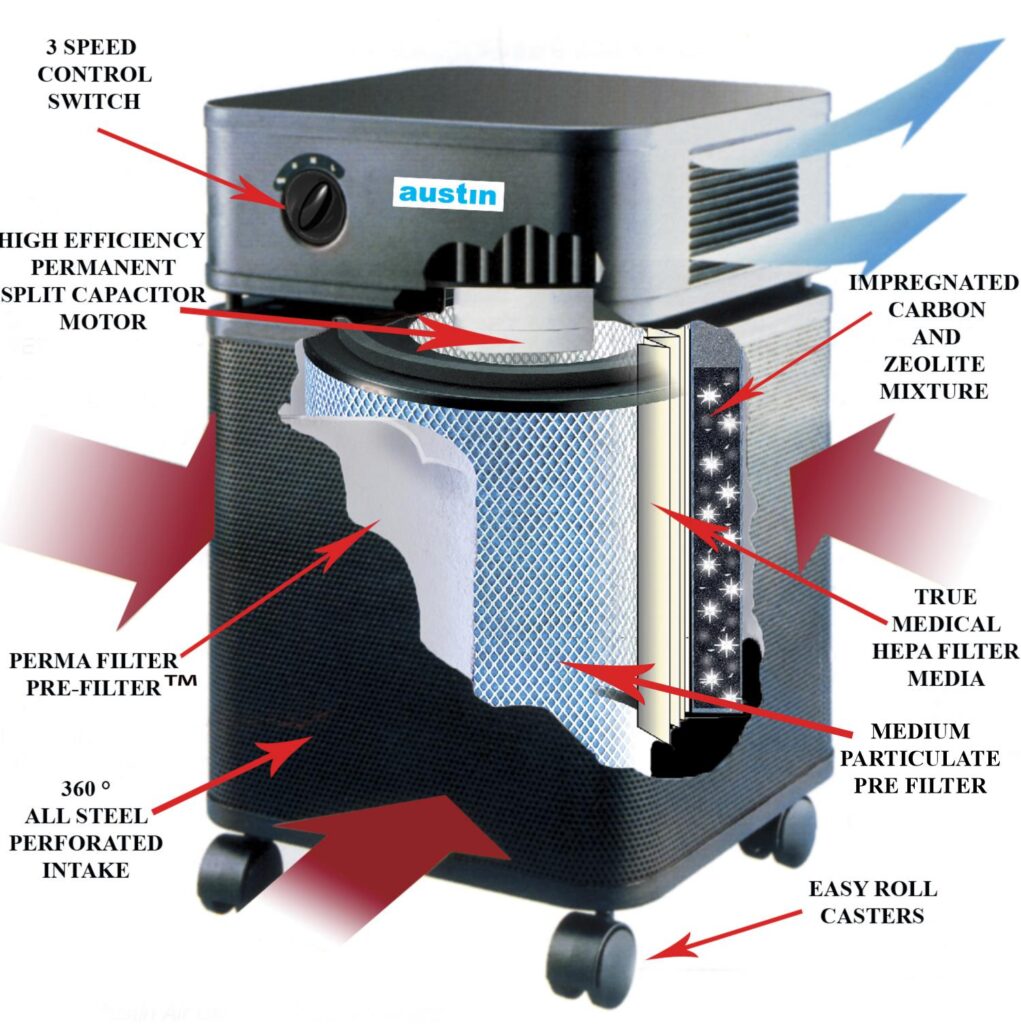
1. Increase Ventilation:
Proper ventilation is one of the most effective ways to improve indoor air quality. Here’s how you can enhance ventilation in your home:
- Use Exhaust Fans: Install exhaust fans in the kitchen and bathrooms to remove moisture, odors, and pollutants directly from these areas.
- Open Windows: When weather permits, open windows and doors to allow fresh air to circulate through your home. This helps dilute indoor pollutants and reduce their concentration.
- Air Purifiers: Consider using air purifiers with HEPA filters to remove airborne particles and allergens. Some models also have activated carbon filters to capture VOCs and odors.
2. Maintain HVAC Systems:
Your heating, ventilation, and air conditioning (HVAC) system plays a crucial role in maintaining indoor air quality. To ensure it’s working effectively:
- Change Filters Regularly: Replace HVAC filters every 1-3 months to keep them free of dust and debris. High-efficiency filters can capture smaller particles, improving overall air quality.
- Schedule Regular Maintenance: Have your HVAC system serviced annually to ensure it’s running efficiently and not contributing to indoor air pollution.
- Install an Air Exchanger: Consider adding an air exchanger to your HVAC system to bring in fresh outdoor air while exhausting stale indoor air.
3. Control Humidity Levels:
Keeping humidity levels in check can prevent mold growth and reduce the presence of dust mites. Here’s how to manage humidity:
- Use Dehumidifiers: In damp areas like basements, a dehumidifier can help keep humidity levels below 50%, which discourages mold and dust mites.
- Fix Leaks: Repair any plumbing leaks or water damage promptly to prevent mold growth.
- Ventilate Moist Areas: Use exhaust fans in bathrooms and kitchens to reduce moisture buildup.
4. Reduce the Use of VOC-Emitting Products:
To minimize VOC emissions in your home:
- Choose Low-VOC Products: Opt for paints, varnishes, and cleaning products labeled as low-VOC or VOC-free.
- Store Chemicals Safely: Keep household chemicals, paints, and solvents in tightly sealed containers, and store them in well-ventilated areas, preferably outside the living space.
- Avoid Air Fresheners: Many air fresheners and scented candles release VOCs. Instead, use natural alternatives like essential oils or simply open windows to freshen the air.
5. Clean Regularly:
Regular cleaning can help reduce the buildup of dust, pet dander, and other allergens:
- Vacuum with a HEPA Filter: Use a vacuum cleaner with a HEPA filter to trap fine particles that can be missed by regular vacuums.
- Dust Surfaces Weekly: Use a damp cloth to dust surfaces, preventing dust from becoming airborne.
- Wash Bedding Frequently: Wash bedding in hot water weekly to kill dust mites and remove allergens.
6. Test for Radon:
Radon is a naturally occurring radioactive gas that can accumulate in homes, especially in basements and crawl spaces. It’s a known cause of lung cancer and can contribute to respiratory symptoms like coughing. Testing your home for radon and mitigating it if necessary is crucial for maintaining a healthy indoor environment.
7. Smoke Outside:
If you or someone in your household smokes, make it a rule to smoke outside. Even with ventilation, indoor smoking significantly degrades air quality and increases the risk of respiratory issues for everyone in the home.
8. Address Mold Issues Promptly:
If you discover mold in your home, it’s essential to address it quickly:
- Clean Small Areas: For small mold infestations, clean the area with soap and water, and use a disinfectant like bleach to kill remaining mold spores.
- Hire Professionals: For larger mold problems, or if you’re concerned about the extent of the contamination, hire a professional mold remediation service.
- Prevent Future Growth: Keep humidity levels low, fix leaks promptly, and ensure proper ventilation to prevent mold from returning.
When to Seek Professional Help
If you’ve taken steps to improve your indoor air quality and still experience persistent coughing, it may be time to consult a professional. Here’s when to seek help:
1. Persistent Symptoms:
If coughing, wheezing, or other respiratory symptoms persist despite improving air quality, see a healthcare provider to rule out underlying health conditions.
2. Indoor Air Quality Testing:
Consider hiring an indoor air quality specialist to conduct a comprehensive assessment of your home. They can identify hidden pollutants, sources of contamination, and provide targeted recommendations for improvement.
3. Mold Remediation:
If you suspect a mold problem that’s too large to handle on your own, professional mold remediation services can ensure the mold is thoroughly removed and prevent future growth.
4. HVAC System Inspection:
If you suspect your HVAC system is contributing to poor air quality, have it inspected and serviced by a professional. They can identify issues like dirty ducts, malfunctioning components, or improper ventilation that may be impacting your air quality.
Conclusion: Breathe Easier by Taking Control of Your Indoor Air Quality
Persistent coughing at home can be more than just an inconvenience—it may be a sign that your indoor air quality needs attention. By understanding the sources of indoor air pollution and taking proactive steps to improve the air you breathe, you can protect your health and that of your family.
Remember, clean air is vital for overall well-being. Regular maintenance, proper ventilation, and mindful product choices can make a significant difference in reducing indoor air pollutants. If necessary, don’t hesitate to seek professional help to ensure your home is a safe, healthy environment.
Investing in the quality of the air inside your home is an investment in your health. Take action today to breathe easier and reduce the risk of respiratory issues caused by poor indoor air quality.
References:
- Environmental Protection Agency (EPA). (2022). “Indoor Air Quality (IAQ).” https://www.epa.gov/indoor-air-quality-iaq
- Centers for Disease Control and Prevention (CDC). (2021). “Indoor Air Quality.” https://www.cdc.gov/healthyhomes/bytopic/airquality.html
- American Lung Association. (2020). “Indoor Air Pollutants and Health.” https://www.lung.org/clean-air/at-home/indoor-air-pollutants
- World Health Organization (WHO). (2018). “Household air pollution and health.” https://www.who.int/news-room/fact-sheets/detail/household-air-pollution-and-health
- Mayo Clinic. (2022). “Chronic Cough.” https://www.mayoclinic.org/diseases-conditions/chronic-cough/symptoms-causes/syc-20351575


